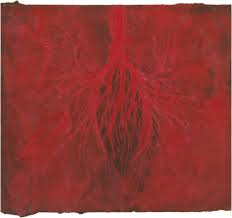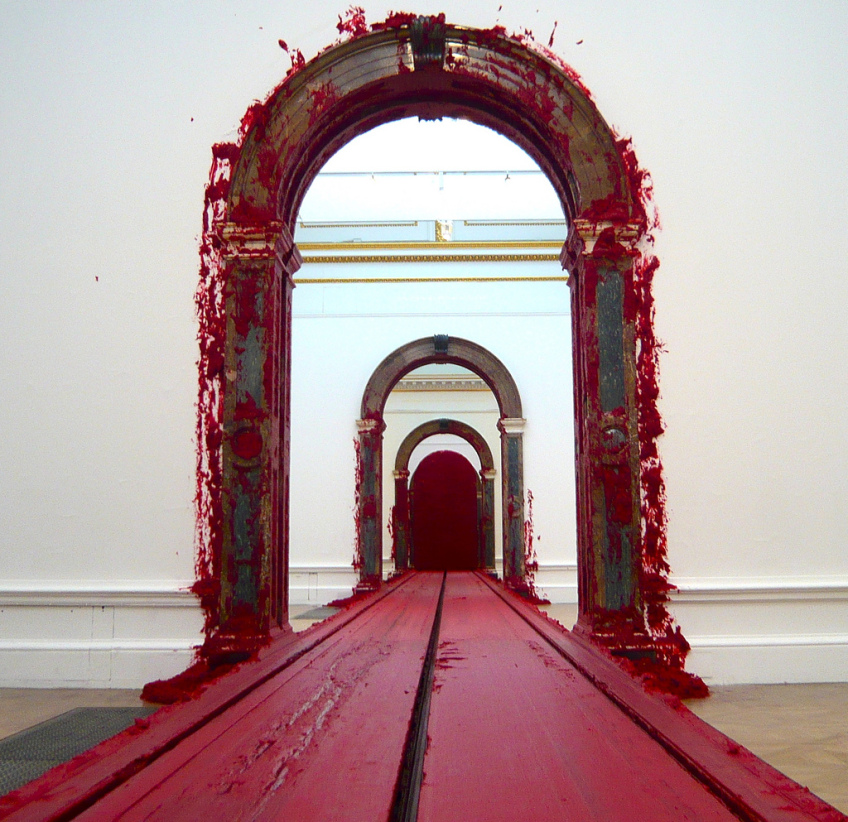





167
Anish Kapoor
Untitled
gouache and watercolour on paper
55.7 x 49.6 cm. (21 7/8 x 19 1/2 in.)
Executed in 1989.
Full-Cataloguing
"Red is a colour I’ve felt very strongly about. Maybe red is a very Indian colour, maybe it’s one of those things that I grew up with and recognise at some other level. Of course, it is the colour of the interior of our bodies. Red is the centre." – Anish Kapoor in conversation with John Tusa, 2003

Anish Kapoor,
Untitled, 1987
Collection of the Museum of Modern Art, New York
Executed in 1989, Untitled is an exquisite early work from Bombay-born artist Anish Kapoor’s legendary oeuvre, created a year prior to his bold exhibition hosted by the British Pavilion of the Venice Biennale that propelled the artist to international acclaim. Primarily renowned for his sculptures that stage complex reconfigurations of space and perception through a measured physicality, Kapoor’s gouaches intimately reveal a more unreserved, painterly approach. Composed of a sensuous colour-palette of maroon-red and earthy black, the lava-like tendrils in the present painting overlap in a richly textured manner. The vivid colours illustrate the artist’s understanding that colour has the ability to transform feelings and provoke emotions, recalling Kapoor’s monumental 2009 solo exhibition at the Royal Academy in London, where red pigment exploded into the gallery confronting viewers with an intense sensory experience. Kapoor’s masterful command of shape, line and colour, as embodied in Untitled, also succeeds in transcending the work beyond the decorative to the sublime.
Anish Kapoor
Svayambhu, 2007
Installation view at the Royal Academy of Arts, London
Confronting the viewer with what the artist describes as ‘a picture of the interior, the interior of me’ (Anish Kapoor, quoted in Jeremy Lewison, Anish Kapoor: Drawings, London, 1991, p.11), Untitled appears to map a mysteriously spiritual terrain through the intricately achieved balances between darkness and light, emptiness and plenitude, and surface and depth. Both abstract and gestural in its execution, Untitled thus represents a more private and personal side to Kapoor’s universally celebrated practice.
As one of the most influential artists of his generation, Kapoor has been the recipient of several international awards, including the prestigious Turner Prize in 1991. Furthermore, his work has found a place in notable museum collections across the world, including the Metropolitan Museum of Art, New York; the San Francisco Museum of Modern Art, California; the Tate Collection, London; and the Hara Museum of Contemporary Art, Tokyo, amongst numerous others.

Anish Kapoor,
Untitled, 1987
Collection of the Museum of Modern Art, New York
Executed in 1989, Untitled is an exquisite early work from Bombay-born artist Anish Kapoor’s legendary oeuvre, created a year prior to his bold exhibition hosted by the British Pavilion of the Venice Biennale that propelled the artist to international acclaim. Primarily renowned for his sculptures that stage complex reconfigurations of space and perception through a measured physicality, Kapoor’s gouaches intimately reveal a more unreserved, painterly approach. Composed of a sensuous colour-palette of maroon-red and earthy black, the lava-like tendrils in the present painting overlap in a richly textured manner. The vivid colours illustrate the artist’s understanding that colour has the ability to transform feelings and provoke emotions, recalling Kapoor’s monumental 2009 solo exhibition at the Royal Academy in London, where red pigment exploded into the gallery confronting viewers with an intense sensory experience. Kapoor’s masterful command of shape, line and colour, as embodied in Untitled, also succeeds in transcending the work beyond the decorative to the sublime.

Anish Kapoor
Svayambhu, 2007
Installation view at the Royal Academy of Arts, London
Confronting the viewer with what the artist describes as ‘a picture of the interior, the interior of me’ (Anish Kapoor, quoted in Jeremy Lewison, Anish Kapoor: Drawings, London, 1991, p.11), Untitled appears to map a mysteriously spiritual terrain through the intricately achieved balances between darkness and light, emptiness and plenitude, and surface and depth. Both abstract and gestural in its execution, Untitled thus represents a more private and personal side to Kapoor’s universally celebrated practice.
As one of the most influential artists of his generation, Kapoor has been the recipient of several international awards, including the prestigious Turner Prize in 1991. Furthermore, his work has found a place in notable museum collections across the world, including the Metropolitan Museum of Art, New York; the San Francisco Museum of Modern Art, California; the Tate Collection, London; and the Hara Museum of Contemporary Art, Tokyo, amongst numerous others.